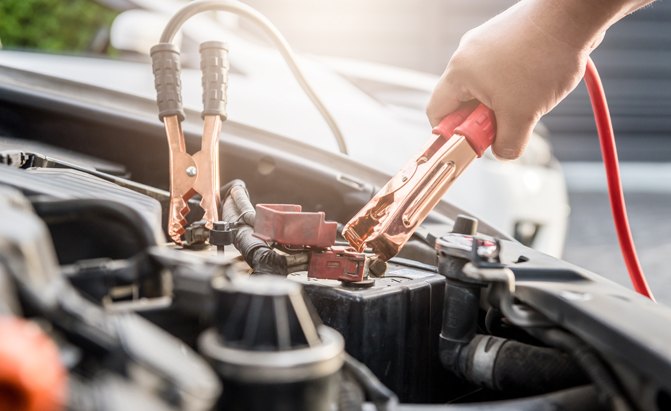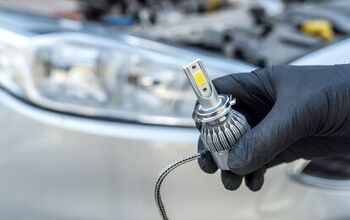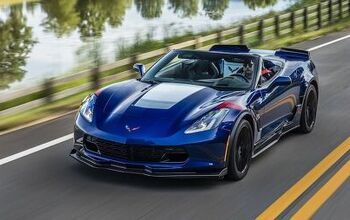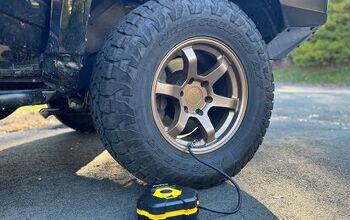Top 10 Best Jumper Cables

Owning a set of jumper cables is almost a necessity for every vehicle owner. It’s an important component to a car emergency kit as you’ll never know when you can get stuck with a dead battery. Having quick and easy access to a reliable set of jumper cables could save you or someone else from being stranded for hours.
Although it may appear that most jumper cables are similar, there are a few characteristics you should look for when choosing the right one for you. We’ve gone ahead and picked out the 10 best car jumper cables, helping you narrow down your choices so you can make a more informed purchasing decision.
For more information on car jumper cables, refer to our table of contents.
Table of contents
- 1. Editor's Pick: Cartman Booster Jumbles Cables with Carrying Bag
- 2. Best Budget Option: Iron Forge Tools 20-foot Jumper Cables
- 3. Longest Cable: Unique Imports Professional Booster Jumper Cable
- 4. Performance Tool W1673 Jumper Cable
- 5. Cartman 20-feet Booster Jumper Cable
- 6. Iron Forge Tools 4 Gauge Jumper Cables with Carry Bag
- 7. Energizer 1-Gauge 800A Heavy Duty Jumper Battery Cables
- 8. Coleman Cable 08660 Heavy-Duty Jumper Cables
- 9. Lifeline AAA 4326AAA Booster Jumper Cable
- 10. EPAuto Heavy Duty Booster Jumper Cable
- What You Need to Know About Jumper Cables
- Occasional But Essential Usage
- What to Consider When Buying the Best Jumper Cables
- Cranking & Peak Amps
- Wire Gauge
- Material
- Clamps
- Length
- Insulation
- Price
- Portable Jump Starters
- What Causes Battery Voltage to Drop?
- How to Jump A Car Battery
- What Happens if I Connect the Cables Incorrectly?
1. Editor's Pick: Cartman Booster Jumbles Cables with Carrying Bag
Cartman is a popular brand when it comes to jumper cables, and you'll see it mentioned more than once on this list. This particular product is a 6-gauge jumper cable measuring 16-feet long, which is 4 feet more than the standard size. These jumper cables feature T-prene coating, making them ultra durable and tangle free. The company says they're able to withstand the outside elements, while its shielded surfaces provide extra protection.
Cartman's jumper cables feature an exclusive inside tongue design that is made for a double connection alongside the battery terminal. These jumper cables come with a carrying bag, making it easy to store so you always have them handy when necessary. The carrying bag also provides protection for the cables when they're not being used.
Pros | 16-foot length, price, durable materials, long operation life, resists low temperatures, 5-year warranty |
Cons | Some complaints that it's hard to fit the cables in the chase, below average quality bag |
2. Best Budget Option: Iron Forge Tools 20-foot Jumper Cables
A more affordable 20-feet option comes from Iron Forge Tools. These jumper cables use 8-gauge wires and are ETL listed and CCA constructed. Since they do measure 20-feet long, they offer plenty of versatility to jump cars that aren't close to one another.
These cables are designed to operate well in all sorts of weather conditions, with copper teeth on its clamps to provide a firm grip on the battery terminals. These cables are color-coded red and black, for positive and negative identification, respectively. They also come with a carrying bag for quick and convenient storage.
While the Iron Forge Tools jumper cables are one of the most expensive offerings on our list, the company offers a lifetime warranty with its product.
Pros | Performs well in all weather conditions, excellent instruction manual, clamps have fantastic grip, lifetime warranty |
Cons | Price, product case is a bit on the small side |
3. Longest Cable: Unique Imports Professional Booster Jumper Cable
If you're needing some real extra length, Unique Imports' Professional Booster jumper cables measure 25-feet long. These are commercial grade cables featuring extra dense, heavy-duty 1-gauge wiring that generate 800A of current. They also come with heavy-duty clamps, although some owners do complain that they're a bit on the smaller side.
Designed to be resistant to rust, these cables are durable and should last a long time. They're color coded as well, making it easy to identify the positive and negative wires. The Professional Booster by Unique Imports comes with a travel bag for convenient storage inside your vehicle so they're always accessible.
Pros | Color-coded red and black cables and clamps, delivers great performance in extreme temperatures, extremely easy to use |
Cons | Clamps are on the smaller side |
4. Performance Tool W1673 Jumper Cable
Performance Tool offers a set of jumper cables that are 20-feet long, which comes in handy when you need to jump start full-size trucks, SUVs, or other large vehicles. The extra length can also come in handy if you're in a situation where two vehicles aren't able to park close to one another. These particular cables are rated to deliver 500A of instant current and 600A of peak current.
Wrapped with a flexible, durable rubber coating, these cables should stay untangled. The heavy-duty clamps, which are made of copper, attach firmly on the battery terminals so they don't easily fall off. These jumper cables are also exceptionally thick, using 4-gauge wires.
Pros | 20-foot cable, offers an impeccable gauge, black and red clamps for easy identification, constructed to stay tangle free |
Cons | 20-foot length takes up a lot of trunk space, reliability against fire us an unknown |
5. Cartman 20-feet Booster Jumper Cable
If you want a longer Cartman product, the company also offers a 20-feet jumper cable. Designed for heavy-duty vehicles such as SUVs, pickup trucks, cargo vans, and freight hauling vehicles, these jumper cables are engineered with long-lasting TPR materials and feature the same exclusive inside tongue design for a double connection on the battery terminal.
Like the other Cartman cables, these are wrapped in T-prene coating that also allows electricity to pass through without any loss of power. The clamps are designed to offer twice the grip than conventional cables, assuring optimized conductivity and tension. These cables are stamped and UL listed.
Pros | 20-foot length, excellent low-temperature resistance, heavy-duty cables, offers sufficient CCA, tangle free |
Cons | Some users complain of stiff clamps |
6. Iron Forge Tools 4 Gauge Jumper Cables with Carry Bag
Also from Iron Forge Tools are these 4-gauge jumper cables with some of the most impressive clamps you'll see in this product category. These high-quality clamps ensure a safe and secure connection to the battery terminals and they're color-coded red and black for easy identification.
These jumper cables do measure 20-feet long, so they provide some extra length when necessary. They also feature temperature-resistant shielding, so they'll deliver exceptional performance and reliability even in extreme temperatures.
These cables are a good option when it comes to price, length, and dependability.
Pros | 20-foot length, premium quality clips, tangle free, lifetime replacement warranty, includes travel bag |
Cons | Weighs a bit on the heavier side |
7. Energizer 1-Gauge 800A Heavy Duty Jumper Battery Cables
You've likely heard of the Energizer brand before, so you shouldn't be too surprised to hear it manufactures jumper cables as well. These 1-gauge heavy duty cables are great if you're looking for a product with higher insulation. Capable of transmitting power up to 800A, these jumper cables will make quick work of jumping any dead battery.
The clamps are manufactured with PVC material to provide safety from shocks, while its 25-foot length makes it one of the longest cables on our list. Since these are heavy-duty cables designed for long-distance connectivity, they're also tangle free and resistant to extreme temperatures. The clamps are molded from stainless steel and offer, firm grip. They're also unaffected by corrosion as a result.
Pros | Copper clad aluminum construction, all-weather durability, weighs only 11.4 lbs, battery doesn't take much time to charge |
Cons | Quality of the coating is questionable, fitting the cables in the carrying bag can be difficult |
8. Coleman Cable 08660 Heavy-Duty Jumper Cables
Another heavy duty, 4-gauge option comes from Coleman Cable. With clamps made from copper-coated aluminum, these cables will transmit power without any loss of electricity. The clamps also feature an alligator design, which gives them an ideal fit for both small and large car batteries.
These jumper cables are designed to fit both top and side terminals, while the stretched jaw has grooves to lock it in place. The clamps are manufactured from a sturdy plastic-coated material that does not conduct heat, while the cables themselves have T-Prene coating for extra flexibility even if the cables have been coiled multiple times.
Made in the U.S.A., this 4-gauge jumper cable offers solid insulation and is available in multiple sizes.
Pros | Ergonomically designed handles, withstands cold and warm climates, polarity labels glow in the dark, well-designed clamps are easy to use |
Cons | A little flimsy overall with questionable durability/longevity |
9. Lifeline AAA 4326AAA Booster Jumper Cable
Offered by Lifeline are these heavy-duty jumper cables that claim to deliver 100% more power compared to standard light duty cables. Available in 16-feet length with good insulation, these jumper cables work on both side and top post battery terminals. With 6-gauge wiring, these jumper cables are more than enough to bring a majority of dead batteries back to life.
The alligator-design clamps are made of heavy plastic so they're shock proof, while offering a firm grip when attached to the battery terminals. Overall, these jumper cables have a sturdy design to withstand low temperatures and inclement weather, making it fully capable of jumping heavy duty vehicles such as vans and trucks.
Pros | Supports small batteries, thicker cables for constant power transmission, clearly labeled polarities, includes zipper pouch |
Cons | Some complaints that the jumper cables have an open circuit on the neutral side |
10. EPAuto Heavy Duty Booster Jumper Cable
If you're looking for reliability on a budget, consider EPAuto's heavy duty booster jumper cable. Manufactured with a rubber material that ensures flexibility, these cables are also covered in a dual-coated material that doesn't melt when transmitting power from 12/24 volts. Featuring sturdy clamps made from a copper-plated material to safeguard against shock, and 4-gauge wiring, these jumper cables works well on a variety of vehicles including trucks, SUVs, vans, and motorcycles.
With a tangle free design and included cotton gloves, these jumper cables are great if you're looking to save costs. Some owners do complain about the clamps and the durability is questionable.
Pros | Copper-plated clamps, tangle free, includes cotton gloves for safety, can be stored in a small space |
Cons | Longevity/durability is questionable, some complaints about poor quality clamps |
What You Need to Know About Jumper Cables
As we mentioned before, jumper cables should be considered a basic auto accessory that every car owner should have in their car emergency kit. Essentially, jumper cables are a pair of dense, industrial-grade wires with alligator clips on each side and their main job is to jump a dead battery back to life. Jumper cables do this by transmitting power from a functional battery to the dead battery.
To understand how jumper cables work, you'll need to know how your car itself works. A vehicle's battery supplies the necessary voltage for the starter to ignite the engine, and that generally takes a good amount of electrical power. If that battery doesn't have sufficient power reservoirs, then the car won't start and you'll need jumper cables. Basically, jumper cables will pull power from a working battery in another car in order to recharge the dead battery, providing enough of a boost so that you can get your battery tested and replaced if necessary.
Typically a car battery has a life span of around five years, although many of them will become noticeably weaker after three years or so. Keep in mind however, a perfectly healthy car battery can drain in a few hours if you accidentally leave on your headlights or even the dome light inside the cabin.
At the end of the day, there are numerous unexpected reasons why your car's battery needs a jump and having a set of cables handy in your trunk can save you a lot of time and a headache.
Occasional But Essential Usage
You may think that jumper cables aren't a necessity, but think of them like auto insurance—you hope you never need to use them, but if you do, you'll be grateful you have them. They won't be a tool you use everyday unless you plan on helping stranded drivers all day long, but it still makes plenty of sense to keep a set in your car's trunk. It's up to you to decide how much you want to spend, as some jumper cables are better quality than others, although a budget option will still get the job done.
What to Consider When Buying the Best Jumper Cables
They all may look similar, but not all jumper cables are the same. It might seem like you're getting a good deal by finding a used set at a local garage sale, but it could turn into a nightmare if they're below average quality. Since the market is filled with plenty of jumper cable options, it becomes tricky to choose the right product. Here are a few factors to take into consideration when shopping for jumper cables.
Cranking & Peak Amps
We recommend to always look for a set of jumper cables with the capacity to offer at least 500 cranking amps and 1200 peak amps. Most car batteries are built with a 660-cranking amps rating. A standard jump starter with a 300-cranking amps rating however can still bring a dead battery back to life.
Now if you own a larger vehicle such as an SUV or pickup truck, you may need more cranking amps and peak amps. If that's the case, make sure you're investing into a set of heavy-duty jumper cables.
Wire Gauge
Wire gauge signifies the thickness of the wires and serves as an indicator for the overall quality and durability of the jumper cables. What's commonly misunderstood with wire gauge however is that the smaller the number, the thicker the wire. That means power cables with a lower number doesn't equal less power.
Generally 8-gauge power cables is sufficient to jump start a car, but 6-gauge is typically recommended. You don't necessarily need 4-gauge wire unless you're needing to jump start a large vehicle, such as a pickup truck. You basically want to avoid 10-gauge power cables, which most auto professionals will say is typically a waste of money.
Material
Once you determine the thickness you want for the jumper cables, you'll want to take a look at some of their materials. The widely recommended option are pure copper cables, but copper-clad aluminum (CCA) is also good. Look for cables with larger alligator clips, allowing for a better connection between the two batteries. This also means the cables will likely transmit more current at a faster rate.
A more practical option for a common motorist is to buy a thicker cable, which will ensure more durability in the longer run. The jumper cables are required to transmit a high level of energy through them and the wires ought to be sturdy, high quality and reliable to ensure no undesirable sparks.
Don't be fooled just because a company is advertising that its jumper cables are heavy duty. Use your own judgment by looking at the wire gauge or thickness as well as its construction to determine whether or not a product is truly made for heavy-duty use.
Clamps
Since jumper cables really don't entail too much, it may be obvious why the clamps are so important. When you're jump starting a car, you need to clamp one end of the cable to the dead battery, while the other end gets clamped to the functional battery. That means you'll want to get heavy-duty clamps that are wrapped in rubber, helping eliminate the possibility of shock. You'll also want to look for jumper cables that are tangle free and easy to hold.
Length
If you've already shopped for jumper cables or took a look at our list of recommended products, you'll realize they come in varying lengths. The minimum length you'll likely see in the market is 12 feet, but those cables aren't very practical. We recommend looking for a product that is at least 20 feet in length, even if you don't drive a large vehicle.
Depending on your situation, it may not be very straightforward to park two vehicles facing one another or even side by side. Longer jumper cables give you the flexibility and versatility to address different scenarios.
Insulation
While not as defining of a feature as wire thickness and length, you will want to make sure your jumper cables are properly insulated. If you're purchasing from a reputable brand such as Cartman, you'll get cables with heavy-duty insulation. It's one of the factors that separates high-quality cables from below average products, and it's generally always better to go with heavier insulation since it's safer.
Price
Anytime you're purchasing anything, price is a factory. As usual, we don't recommend basing your final purchasing decision solely on price, especially when it comes to automotive parts and accessories. You generally get what you pay for when it comes to car parts, which means a cheaper set of jumper cables likely won't last very long, or worse, could be a safety hazard.
If however you feel inclined to save money, consider a set of jumper cables that are designed and engineered for use with smaller engines and standard 12V automotive batteries. More expensive cables—generally those rated 6 gauge or below—are designed to work with both 12V and 24V batteries.
Price is a principal consideration for the majority of motorists, but we do not recommend basing your decision solely on price. Remember, you often get what you pay for, and a cheaper set of jumper cables might not last long or might even be a safety hazard. However, if you are going to buy low-priced jumper cables, then you should be considering options engineered for use with the smaller engines and standardized 12V automotive batteries. These jumper cables are recommended for larger vehicles and come in handy on farms or construction sites.
Portable Jump Starters
You can go one step beyond jumper cables by investing into a portable jump starter. Generally portable jump starters are more expensive, but they offer a lot more features and added convenience. Some have USB ports to charge electronic devices and some serve as power banks as well.
Another convenient feature to look for if you're shopping for a portable jump starter is a built-in flashlight, which can always come in handy when you're working under the hood of your car. Some high-end portable jump starters may even have a built-in air compressor that can inflate a tire.
Lastly, some portable jump starters even offer entertainment with a built-in radio. That won't help you bring your car's battery back to life, but at least you'll have something to listen to if you're stuck in a situation where a jump start isn't going you anywhere.
What Causes Battery Voltage to Drop?
There are several factors that can cause a car's battery voltage to drop. If a car sits idle for an extended period of time in extreme temperatures, it could lose some of its voltage. Or perhaps a cell within the battery has become damaged, or you simply forgot to turn off your headlights. Owners of electric vehicles will also know that cold weather generally has a negative effect on a car's battery.
Most importantly, if you noticed that your car's battery voltage is low and the battery itself is old, it's time to get a replacement before you get stuck.
How to Jump A Car Battery
- Park the functioning vehicle in a way so that both cars' batteries are accessible and close to one another. Generally that means the cars are facing each other, but sometimes side-by-side works.
- Vehicles with automatic transmissions should be left in park, while vehicles with manual transmissions should be in neutral.
- To be on the safe side, make sure the parking brake is on in both vehicles so neither of the unexpectedly move.
- Make sure both vehicles are turned off and the keys are out of the ignition.
- Place the jumper cables nearly on the ground and ensure the clamps are not touching one another.
- Open the hood of both vehicles and locate the batteries and their terminals. These terminals are color coded, with red signifying positive (+) and black signifying negative (-).
- If you noticed the battery terminals have buildup, clean them off with a wire brush or rag before attaching the clamps of the jumper cables.
Attaching the Jumper Cables and Jumping the Battery
- Start by attaching the positive (red) cable clamp to the + (red) terminal of the dead battery. Make sure the clamp is firmly attached to the battery terminal.
- Do the same with the other end of the jumper cable to the operational vehicle's battery.
- Once the positive cables are firmly attached on both batteries, clamp the negative (black) cable to the functional battery's - (black) terminal.
- The most important step here is to not attach the negative (black) clamp to the dead battery's - terminal. Instead, you will want to clamp it a clean, unpainted metal surface under the dead vehicle's hood. Connecting the cable to the negative post of the dead battery could result in an explosion!
- Once all four clamps are secured in their proper places, you can start the car with a functional battery.
- Wait for a good minute or two—depending on the age of your battery and how long it's been since it stopped working, it may require some time for it to get enough juice to jump start.
- Try starting the car with the dead battery. If the vehicle fails to start, give it a few more minutes for the functional car to charge the dead battery before attempting again. Moderately revv'ing the engine on the functional car while charging the dead battery could help.
- Once the dead battery successfuly starts, you can start disconnecting the jumper cables.
- Begin with the negative (black) clamps, and again, do not let the clamps touch one another while any other part of the jumper cables is still attached to a vehicle.
- Once you have all four clamps safely off the vehicle, take the jump-started car for a drive. This will allow the car's alternator to charge the battery so it won't die again. Keep in mind however, if the battery is completely dead, a jump start is just a temporary solution. Head to a local auto parts store and get a new battery.
What Happens if I Connect the Cables Incorrectly?
It's extremely important to pay close attention when attaching the clamps to your vehicle. Connecting the jumper cables incorrectly is a serious safety issue, which is why jumper cables come marked with clear connection indicators. If you accidentally join the clamps to the wrong terminals, sparks will erupt which may burn the battery's terminal. In worst case scenarios, the battery might even rupture and acid spray is possible.
Modern portable jump starters do have safeguards for motorists against this sort of hazard. Regardless, when jump starting a vehicle, always pay close attention to how you're connecting the cables.
We are committed to finding, researching, and recommending the best products. We earn commissions from purchases you make using the retail links in our product reviews. Learn more about how this works.
Photo credit: Oyls / Shutterstock.com

Jason Siu began his career in automotive journalism in 2003 with Modified Magazine, a property previously held by VerticalScope. As the West Coast Editor, he played a pivotal role while also extending his expertise to Modified Luxury & Exotics and Modified Mustangs. Beyond his editorial work, Jason authored two notable Cartech books. His tenure at AutoGuide.com saw him immersed in the daily news cycle, yet his passion for hands-on evaluation led him to focus on testing and product reviews, offering well-rounded recommendations to AutoGuide readers. Currently, as the Content Director for VerticalScope, Jason spearheads the content strategy for an array of online publications, a role that has him at the helm of ensuring quality and consistency across the board.
More by Jason Siu












































Comments
Join the conversation